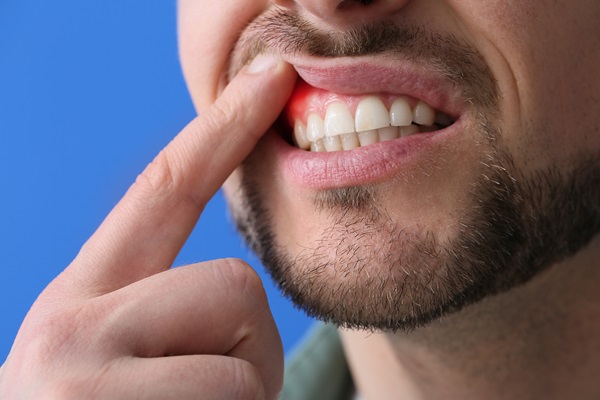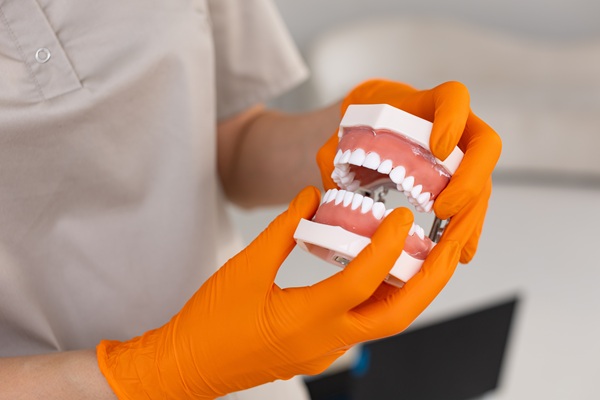How Tooth Decay and Gum Disease Are Connected

Most dental issues (predominantly tooth decay and gum disease) are caused by plaque, a sticky bacterial film. Continue reading to learn how tooth decay and gum disease are connected. This is why bacterial plaque is often the focus of rigorous at-home oral care regimens and regular dental exams.
Bacterial plaque and tooth decay
Plaque bacteria thrive by coexisting in areas where they can easily accumulate in the mouth. If bacteria can build up on the teeth, they begin producing acids from the debris of foods and beverages. Due to the stickiness of plaque, these acids may bond to the teeth and erode the enamel, initiating the process of dental decay. Most of the acid production happens after meal consumption. This means the teeth are at risk of developing plaque within a few minutes after consuming a meal or drink.
Tartar accumulation and gum disease
The same bacterial acids that eat away at tooth enamel may also cause infection of the gum tissue and the bone that supports the teeth. When plaque is not completely removed from the teeth, it hardens into tartar. Tartar accumulation provides a thriving condition for gum disease. It has a cumulative effect — tartar forms as plaque continue to build upon the teeth. As a result, additional plaque adheres to this tartar, and the process continues.
The first and mild form of gum disease, called gingivitis, causes the gums to become red, inflamed, and readily bleeding. Plaque attaches to the tooth and gum line, irritating the area surrounding the teeth. Allowing plaque and tartar to build up along the gumline and behind the gums allows bacterial toxins to destroy the bone and ligaments around the teeth. This leads to the advanced stage of gum disease, known as periodontitis.
The following are some important tips for tooth decay and gum disease prevention:
Fluoride treatment
If the tooth enamel is weak, the teeth will be less able to fight the effects of bacterial acids. However, there is a simple approach to maintaining healthy and strong tooth enamel. Fluoride toothpaste can help remineralize and fortify the enamel. Additionally, the dental professional will inquire about additional fluoride sources, like mouthwashes, supplements, or varnishes.
Maintain excellent oral health care
Poor oral hygiene increases the risk of gum disease and tooth decay. Bacteria multiply faster when they are not cleaned off regularly. Dentists suggest brushing and flossing at least twice daily, making sure to clean the plaque that often accumulates along the gum line and between the teeth.
Once plaque hardens into tartar, it cannot be cleaned off with a toothbrush. Therefore, patients need to visit the dentist regularly for cleaning and checkups. Before more severe dental problems develop, the dental professional will discover and treat any decay or gum issues during these sessions.
The bottom line
The one thing connecting gum disease and tooth decay is bacterial plaque. With a diligent personal oral care routine and regular visits to the dentist, you can maintain good oral health.
Request an appointment here: https://www.foothillfamilydentists.com or call Foothill Family Dentistry at (949) 506-2115 for an appointment in our Foothill Ranch office.
Check out what others are saying about our dental services on Yelp: Gum Disease in Foothill Ranch, CA.
Recent Posts
Many individuals are familiar with gum disease. What may be unknown, however, is the relationship of diabetes to problems with the gums. Diabetes is the result of multiple diseases within the body that accumulate from too much sugar in the bloodstream. Sugar often becomes the culprit that is responsible for an individual's gum disease. Continue…
Seeing a preventive dentist is a vital part of your oral healthcare routine each year. However, many people skip this essential step because they do not want to spend time at a dental office. Fortunately, a preventive dentist provides many valuable services that can help your smile last a lifetime and stop future issues before…
Preventive dentistry involves using the right products. This includes selecting the right toothpaste. There is a type of toothpaste for every person. If you want to enhance your preventive dentistry brushing strategy, here are some tips on choosing the right toothpaste.The attending dentist will be the judge of the most suitable toothpaste. The dentist knows…
Preventive dentistry goes beyond undergoing dental checkups and cleanings twice a year. Read on to learn how preventive dentistry can protect against various oral health issues. You ensure a lifetime of good oral health and ultimately your general health if you keep those regular checkups. Preventive dental care checkups help you stay proactive in many…


